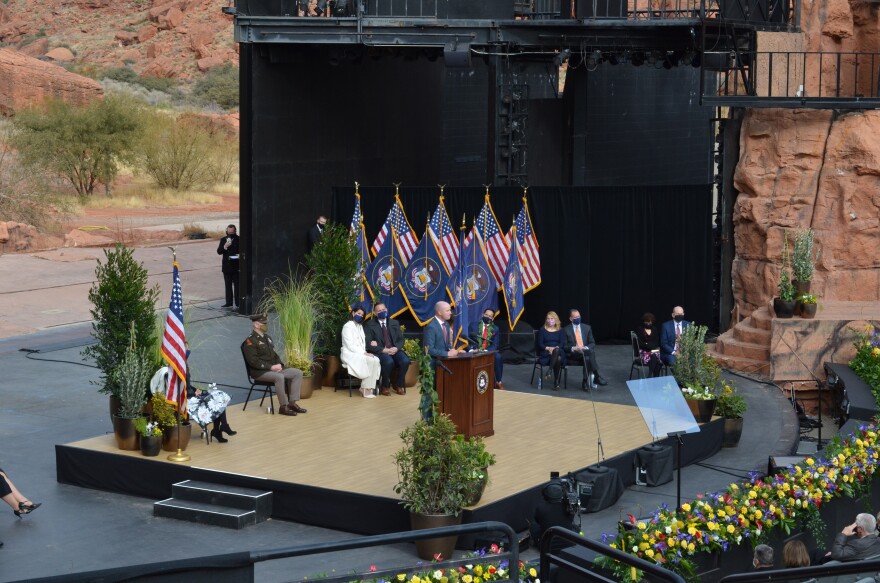Spencer Cox was sworn in as Utah’s 18th governor Monday at an inauguration ceremony in the southwest town of Ivins in Washington County. Lt. Gov. Deidre Henderson, Attorney General Sean Reyes, Treasurer David Damschen and Auditor John Dougall also took their oaths of office. The event also coincided with the 125th anniversary of Utah statehood.
The ceremony was at the outdoor Tuacahn Arts Center, set against the red rocks of Snow Canyon. Masked attendees were spaced out in the amphitheater and everyone had to have gotten a negative rapid COVID-19 test in the last 24 hours.
St. George resident Jimi Kestin, who chairs the Washington County Republican Party, attended the ceremony, and said he’s excited that southern Utah is being recognized by the new administration.
“I think it's really impressive that our new governor thought to honor southern Utah by having his inauguration here,” Kestin said. “Certainly we know here in Utah's Dixie that there is no more beautiful place than our county and the Tuacahn Amphitheater, and to have the first inauguration of a Utah governor not held in Salt Lake here in our community is really impressive.”
In his inaugural address, Cox told the story of two Utahns who viewed Washington County very differently. One, Parley P. Pratt, described the area in 1849 as “a rugged, stony, sandy almost indescribable country, thrown together in dreadful confusion” that “show[ed] no signs of water or fertility.” The other, Orval Hafen, was born there about 50 years later, but saw promise instead. Hafen bought a small ranch that did not have running water and set out to fix that himself.
Cox said 2020 was a difficult year, and one that could be described in a similar way that Pratt described Washington County. But he urged Utahns to view this as a time of opportunity like Hafen did.
“At times our hands may hang down and our hearts may fail us, but even when we feel tired, we must never give up,” Cox said. “It’s our turn to write the next chapter of Utah’s history and prove that yes indeed our greatest days still lie ahead.”
Cox’s speech was light on policy, but he warned that the increased spread of disinformation and political division was dangerous to the future of the country’s democracy.
“We have sadly realized that we are far more divided than at any time in our lifetimes as the news is filled with civil unrest and protests, including one right outside this venue today,” Cox said, referring to a group protesting outside the inauguration ceremony over COVID-19 public health restrictions and mask mandates. “Hateful rhetoric dominates our political discourse. We are facing a crisis of empathy; a scourge of contempt. Very little feels ‘United’ about the United States today.”
He said Utah is “the perfect place” to fix political division and quoted former federal Judge Thomas Griffith’s advice on how to do so.
“We must seek to understand one another, to treat each other not as enemies, but as friends, and to secure justice for all without demonizing and ostracizing those with whom we disagree,” Griffith wrote.
Lt. Gov. Deidre Henderson Takes Office
Deidre Henderson is the second woman to hold office as Utah’s lieutenant governor. The first was former Gov. Olene Walker, who served as second-in-command from 1993 to 2003, before becoming the state’s first woman governor.
Last year, as a state senator representing Spanish Fork, Henderson sponsored a resolution celebrating the 150th anniversary of women’s suffrage in Utah. During her speech Monday, she acknowledged the state as a leader in women’s rights.
“I’m here today because of those bold actions and the pathways paved by women like Sen. and Dr. Martha Hughes Cannon and Rep. Alice Merrill Horn, who represented their constituents in the chambers of the Utah Legislature decades before most women in America could vote,” Henderson said. “Utah has been a beacon to the nation for many years.”
Henderson commended the state’s response to the coronavirus pandemic and Utahns’ care for their neighbors during this time.
But she noted that work still needs to be done to address inequality and invited the state’s residents to participate.
“We need more women, minorities and rural Utahns speaking up about every aspect of how our state is run,” she said. “There will be no token leadership at our table.”




